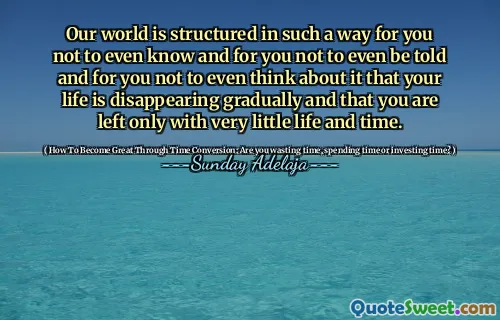
The minimum you should do with your life is to at least reproduce it.
This quote sets a provocative baseline for the purpose of existence by framing reproduction as the minimal achievement one should aim for in life. On the surface, the idea of "reproducing" life can be understood biologically, emphasizing the continuation of the species as a foundational human imperative. However, a deeper interpretation invites reflection on the legacy and contributions we leave behind, which may extend beyond mere biological reproduction.
By asserting that the "minimum" we should do is to reproduce life, the quote subtly challenges us to think beyond simply living for ourselves. It encourages a broader concept of creating value that transcends the individual — whether through raising the next generation, passing down knowledge, or inspiring others to carry on meaningful endeavors. Reproduction, in this metaphorical sense, involves nurturing growth in others and ensuring that positive aspects of our existence are perpetuated.
In the context of the referenced book, "How To Become Great Through Time Conversion," the quote aligns well with the idea of how we invest our time. Simply spending time to survive or waste it limits the impact we have, while investing time implies purposeful action involving contribution and growth. Reproduction here might symbolize the investment of time and effort in nurturing something greater than oneself, whether it be family, community, or personal development that echoes forward.
While reproduction can literally mean having children, the quote's broader philosophical push reminds us that life’s value is often measured by the continuation and expansion of our efforts and creations. Balancing this with our individual aspirations leads us toward a life that is both meaningful and enduring. Ultimately, considering reproduction as a minimum standard both humbles and motivates us to forge a path of lasting significance.









